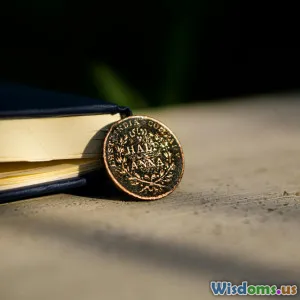
Inside the World of Rare Book Collecting Insights and Advice
7 min read Explore rare book collecting with expert tips, fascinating insights, and guides to building a valuable collection. (0 Reviews)
Inside the World of Rare Book Collecting: Insights and Advice
Rare book collecting is more than a hobby; it’s a journey through history, art, and culture, intertwined with the thrill of discovery and the satisfaction of preservation. From pristine first editions to fragile manuscripts penned centuries ago, rare books offer a tangible connection to the past, a silent dialogue across generations.
The Allure of Rare Books
Why do collectors become mesmerized by rare tomes? There's the undeniable romance of owning something unique, a piece of literary heritage imbued with stories beyond the text—stories of printing presses, authors’ corrections, and bookbinding artistry.
Example: Owning a first edition of Mary Shelley’s Frankenstein not only provides a glimpse into the origins of the modern novel but also offers insights into 19th-century publishing and design. Sotheby’s auctioned an original 1818 edition in 2018, fetching over $140,000, exemplifying both cultural and financial value.
Understanding What Makes a Book Rare
Edition and Printing
The rarity of a book often hinges on whether it is a first edition or if it contains unique features such as author signatures or limited print runs. First editions typically carry higher value, especially if the work is a cornerstone of literature or has historical importance.
Real-World Fact: The first edition of J.K. Rowling’s Harry Potter and the Philosopher’s Stone, published in 1997, had only 500 copies printed. Today, these can sell for tens of thousands of dollars.
Condition
Condition dramatically affects value. Collectors assess books for completeness (dust jacket included), binding integrity, and absence of marks or damage. Grading systems range from 'fair' to 'fine' condition.
Provenance
The history of ownership can elevate a book’s significance. Books owned by notable figures or with historical annotations attract extra attention. For instance, a Shakespeare folio annotated by a famous scholar adds layers of interpretation and worth.
Key Insights for Aspiring Collectors
Focus Your Collection
Begin with a niche that resonates personally—be it classic literature, antique atlases, or early printing techniques. Specialization makes learning manageable and increases your chance of acquiring valuable items.
Sharon Smith, a seasoned rare book dealer, says, "One of the biggest mistakes new collectors make is casting too wide a net. Focusing sharpens both knowledge and opportunities to acquire gems."
Learn to Authenticate
Distinguishing genuine rare books from reprints or forgeries is critical. Many online resources, including databases like the ISTC (Incunabula Short Title Catalogue), provide bibliographical details.
Visit book fairs, auctions, and libraries to handle books firsthand and consult experts. Sometimes, books contain telltale printer marks, paper textures, or typographical quirks unique to one edition.
Network with Professionals and Enthusiasts
Joining collectors’ societies or attending rare book fairs can offer priceless contacts and insights. The ABAA (Antiquarian Booksellers’ Association of America) is one such platform offering resources to both beginners and pros.
Preservation is Paramount
Rare books demand meticulous care. Keep them in controlled environments—away from light, humidity, and fluctuating temperatures. Use acid-free storage boxes and avoid unnecessary handling.
Investing in Rare Books: A Balanced Approach
Rare books can be an investment, but experts caution against viewing collecting solely through a financial lens.
Data Point: According to the Rare Book Market Report 2023, the market for rare books grew steadily by 4.5% annually over the past decade, with a peak demand for modern first editions and antiquarian manuscripts.
However, value is volatile, influenced by changing tastes, author prominence, and market trends. Building a diverse collection with enduring literary or historical significance tends to offer better long-term return.
Memorable Collecting Stories
- John Carter, a legendary bibliographer, famously traced a stolen and annotated Gulliver’s Travels copy, helping recover a priceless Victorian-era manuscript.
- A Canterbury Tales first edition survived a house fire thanks to quick thinking and special protective casing, underscoring the unpredictability of conservation.
How to Start Your Own Rare Book Journey
- Educate Yourself: Read bibliographies, attend lectures, and explore online databases.
- Visit Bookshops and Auctions: Handle books to appreciate their physical qualities.
- Start Small: Acquire affordable rare editions and learn from handling them.
- Document Your Collection: Keep detailed records, including purchase information and any provenance.
- Consult Experts: Regular appraisals and condition checks prevent surprises.
Conclusion
Rare book collecting is a rewarding blend of scholarship, passion, and sometimes investment. It demands patience, keen eye, and respect for cultural heritage. Every collector not only preserves physical volumes but keeps stories alive, uniting readers across centuries.
Whether you're captivated by the allure of antiquarian tomes or modern first editions, remember that behind every rare book lies a world of history, craftsmanship, and human connection just waiting to be explored.
“Collecting is an addiction, but it’s an addiction with purpose.” – Unknown Collector
Rate the Post
User Reviews
Popular Posts





















